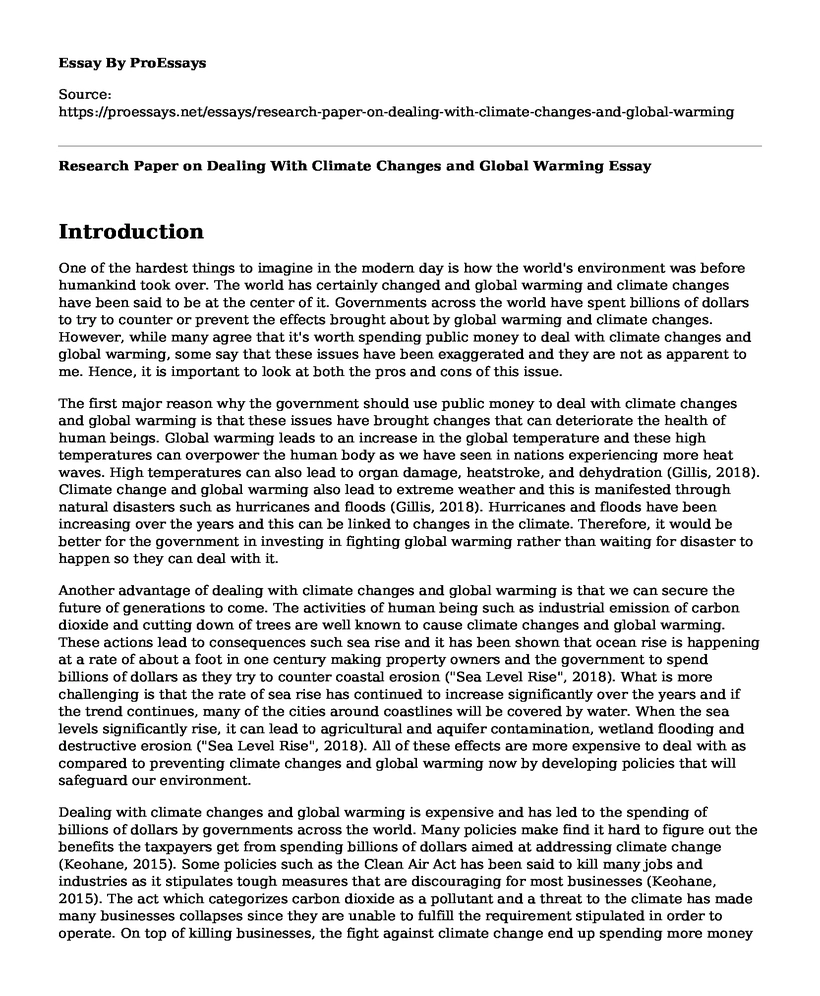Introduction
One of the hardest things to imagine in the modern day is how the world's environment was before humankind took over. The world has certainly changed and global warming and climate changes have been said to be at the center of it. Governments across the world have spent billions of dollars to try to counter or prevent the effects brought about by global warming and climate changes. However, while many agree that it's worth spending public money to deal with climate changes and global warming, some say that these issues have been exaggerated and they are not as apparent to me. Hence, it is important to look at both the pros and cons of this issue.
The first major reason why the government should use public money to deal with climate changes and global warming is that these issues have brought changes that can deteriorate the health of human beings. Global warming leads to an increase in the global temperature and these high temperatures can overpower the human body as we have seen in nations experiencing more heat waves. High temperatures can also lead to organ damage, heatstroke, and dehydration (Gillis, 2018). Climate change and global warming also lead to extreme weather and this is manifested through natural disasters such as hurricanes and floods (Gillis, 2018). Hurricanes and floods have been increasing over the years and this can be linked to changes in the climate. Therefore, it would be better for the government in investing in fighting global warming rather than waiting for disaster to happen so they can deal with it.
Another advantage of dealing with climate changes and global warming is that we can secure the future of generations to come. The activities of human being such as industrial emission of carbon dioxide and cutting down of trees are well known to cause climate changes and global warming. These actions lead to consequences such sea rise and it has been shown that ocean rise is happening at a rate of about a foot in one century making property owners and the government to spend billions of dollars as they try to counter coastal erosion ("Sea Level Rise", 2018). What is more challenging is that the rate of sea rise has continued to increase significantly over the years and if the trend continues, many of the cities around coastlines will be covered by water. When the sea levels significantly rise, it can lead to agricultural and aquifer contamination, wetland flooding and destructive erosion ("Sea Level Rise", 2018). All of these effects are more expensive to deal with as compared to preventing climate changes and global warming now by developing policies that will safeguard our environment.
Dealing with climate changes and global warming is expensive and has led to the spending of billions of dollars by governments across the world. Many policies make find it hard to figure out the benefits the taxpayers get from spending billions of dollars aimed at addressing climate change (Keohane, 2015). Some policies such as the Clean Air Act has been said to kill many jobs and industries as it stipulates tough measures that are discouraging for most businesses (Keohane, 2015). The act which categorizes carbon dioxide as a pollutant and a threat to the climate has made many businesses collapses since they are unable to fulfill the requirement stipulated in order to operate. On top of killing businesses, the fight against climate change end up spending more money from the public making it harmful economically (Bell, 2018).
Furthermore, the current policies of dealing with climate changes and global warming have accused of not being based on supportive scientific evidence instead they are politically made to benefit only some section of the economy (Bell, 2018).
Reference
Bell, L. (2018). The Alarming Cost Of Climate Change Hysteria. Retrieved from https://www.forbes.com/sites/larrybell/2011/08/23/the-alarming-cost-of-climate-change-hysteria/
Gillis, J. (2018). Climate Change Is Complex. We've Got Answers to Your Questions. Retrieved from https://www.nytimes.com/interactive/2017/climate/what-is-climate-change.html
Keohane, R. O. (2015). The global politics of climate change: Challenge for political science. PS: Political Science & Politics, 48(1), 19-26.
Sea Level Rise. (2018). Retrieved from https://www.nationalgeographic.com/environment/global-warming/sea-level-rise/
Cite this page
Research Paper on Dealing With Climate Changes and Global Warming. (2022, Jul 27). Retrieved from https://proessays.net/essays/research-paper-on-dealing-with-climate-changes-and-global-warming
If you are the original author of this essay and no longer wish to have it published on the ProEssays website, please click below to request its removal:
- Clean Water, Gap Between Rich and Poor, Ethnic Conflict and Terrorism Paper Example
- Merchants of Doubt Documentary Essay Example
- Essay Example on 4 Global Threats: Globalization, Climate Change, War, Tech
- Essay Example on The Signal and the Noise: Probability and Statistics in Real-World Predictions
- Essay Example on Leadership in Disaster: The 3 C's of Command, Control, and Curbing
- Essay Example on Troy Maxson: A Man of Strength, Hard Work, and Imagination
- Free Essay Example on Ethanol & Fuel: Advantages of Biofuel Additive for Gasoline







